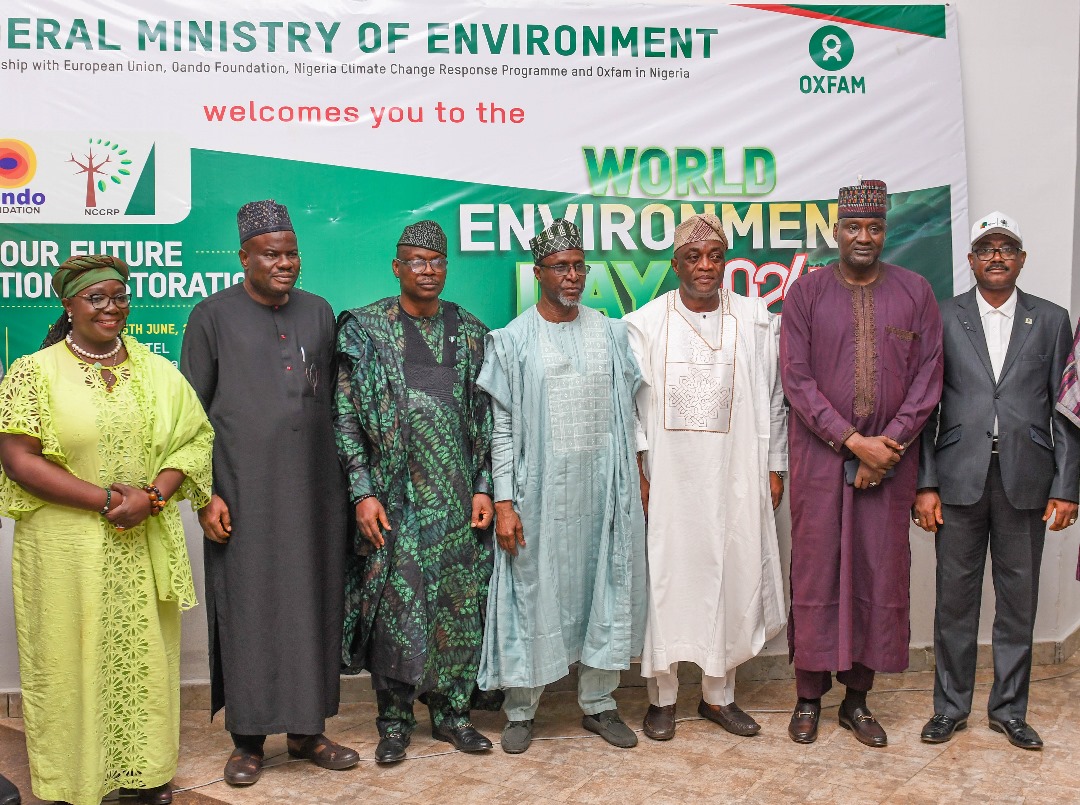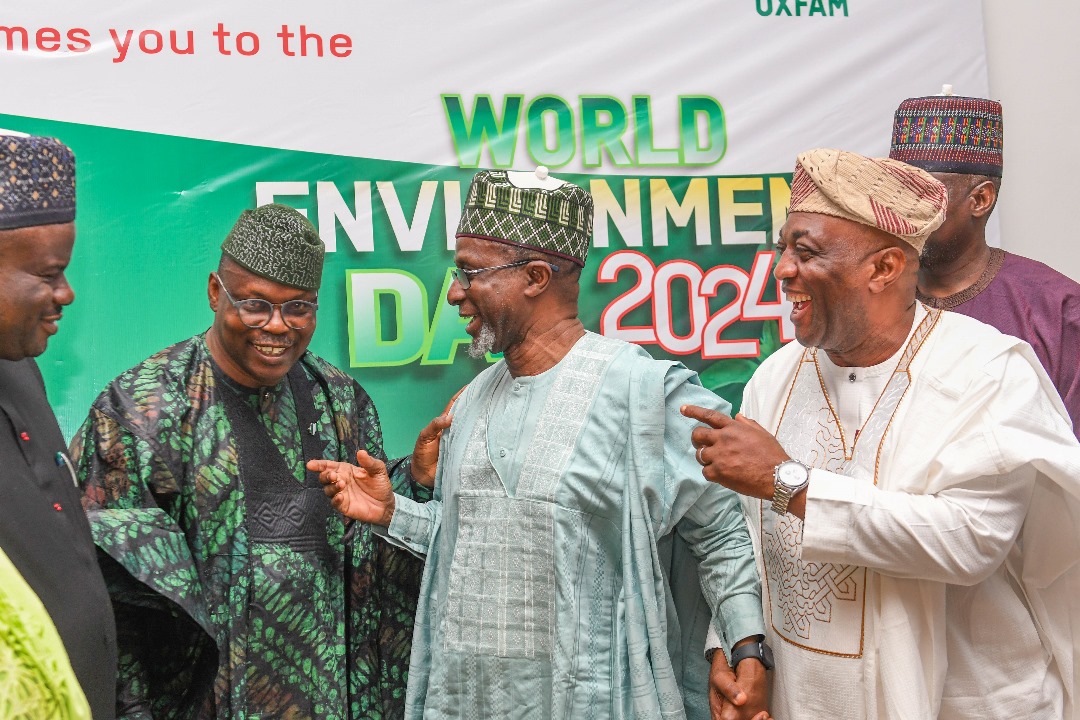
By Miriam Humbe
Minister of the Environment, Balarabe Abbas Lawal has said that to attain environmental sustainability, we must strengthen pollution control measures and promote sustainable waste management practices.
The Minister said this on Wednesday at the event to commemorate the World Environment Day.
The World Environment Day is celebrated annually on the 5th of June and serves as a vital reminder of our collective responsibility to safeguard our planet.
Humsimedia gathered that it is a day dedicated to fostering global awareness and action for the protection of the environment, globally.
This year’s theme “Land Restoration, Desertification and Drought Resilience” emphasized not only the importance of protecting what we have but also the need to restore and rejuvenate our agricultural landscape in order to ensure food security and sustain a heathy ecosystem for our future generation.
Lawal said: “This call to action resonates deeply with this administration’s Renewed Hope Agenda aimed at sustainable development and environmental stewardship.”
He said that Nigeria, like many other countries around the world, is facing significant environmental challenges.
He said: “Our land resources are under immense pressure from a variety of factors ranging from deforestation, unsustainable land management practices and the adverse impacts of climate change.
“These challenges not only threaten the health and well-being of our people but also jeopardize the sustainability of our ecosystems and the prosperity of future generations.
“Our Semi-Arid and Sahel regions are characterized by land degradation, drought, and desertification and in turn exacerbate poverty and food insecurity within the society.
“These factors also contribute to joblessness, social unrest and conflict in these areas.”
He emphasized the need to collectively take decisive actions capable of reversing these trends and build a more sustainable future before it becomes too late.

The Minister said that despite these challenges, Nigeria is making significant progress in addressing land degradation and desertification through initiatives such as the Great Green Wall Project (GGW), Nigeria Erosion and Watershed Management Project (NEWMAP) and Agro-Climatic Resilience in Semi-Arid Landscape (ACResal).
He said that measures have been implemented through these programmes and projects to restore degraded landscapes, promote sustainable land management practices and enhance the resilience of communities to drought and desertification.
Lawal said this his Ministry has strengthened partnerships with local communities, civil society organizations, and international partners to mobilize resources and expertise towards reviving our lands, ecosystem and the environment in general.
He urged the stakeholders to recommit themselves to the goal of accelerating land restoration, enhancing drought resilience, and combating desertification.
He said: “This requires concerted efforts of all stakeholders, including Government Agencies, Private Sector, Academia, and Civil Society Organizations (CSO’s).”
“Air, water and soil pollution poses severe threats to public health and the environment.
“Our efforts to reduce plastic waste and encourage recycling must be intensified at all levels.
“At this juncture, I would like to urge all stakeholders to join the Ministry of Environment and other Agencies in our efforts to strengthen the enforcement of existing environmental laws and regulations with a view to preventing further degradation of our land resources.
“This includes promoting sustainable land use practices, enforcing land tenure rights and cracking down on illegal logging, deforestation, poaching and all other acts capable of destroying our natural environment.
“We must invest in the rehabilitation and restoration of degraded landscapes through afforestation, reforestation, and sustainable land management techniques that would enhance ecosystem services such as carbon sequestration and water filtration.
“Globally, there is the need to explore technologies that will drastically reduce Green House Gas (GHG) Emissions especially in the transport sector and other domestic appliances.
“We must endeavour to mainstream climate change adaptation and resilience-building measures into our national development plans and policies.
“This includes promoting climate-smart agriculture, and providing support to vulnerable communities to adapt to changing environmental conditions.
“International cooperation and partnerships must be strengthened to address trans-boundary environmental challenges and share best practices.
“Nigeria will continue to collaborate with neighbouring countries in the Sahel region to implement the Great Green Wall project as well as harness the expertise and resources of international organizations and donors.”
He expressed his Ministry’s appreciation to President, Bola Ahmed Tinubu for his continued support toward a greener and healthier environment in Nigeria and beyond.
Dr Iziaq Adekunle Salako, the Minister of State for Environment said it is unfortunate that the world continues to grabble with massive socio-environmental challenges emanating from the Climate Change crisis.
Salako emphasized that importance of investing in nature to attain environmental sustainability.
He said that the benefit of investing in nature are immense and not easily matched by any technological dependent solutions.
He revealed that the World Economic Forum has found that a nature-positive economy could generate up to 10.1 trillion USD in business value every year and create 395 million jobs by 2030.
All told, about 55% of global GDP or about 58 trillion USD is moderately or highly dependent on high-functioning biodiversity and ecosystem services.
As of 2022, the International Labour Organization estimated that 20 million new jobs could be created by harnessing the power of nature to address challenges such as climate change, disaster risk, food and water insecurity.
Salako said: “I call for more investments on nature in Nigeria and the global south countries, who today ate the stewards of global biodiversity.
“When we invest in nature, we protect our ecosystems, safeguard our people, provide good jobs, ensures food security, invites further investment, stabilizes our economy, shelters ourselves from climate change, and preserves our indigenous ways of life.
“Investing in nature is investing in our future and will yield dividends in multiple folds.”


